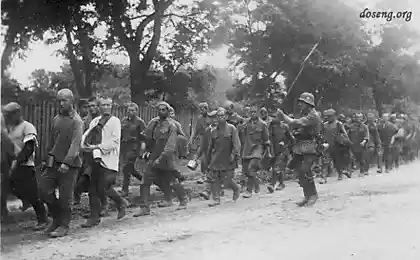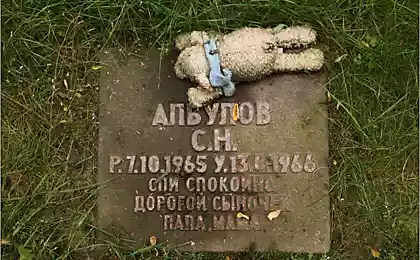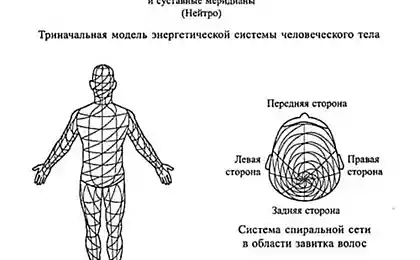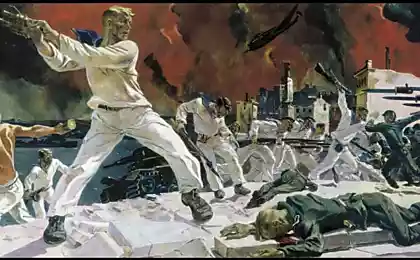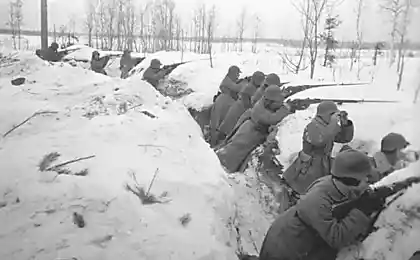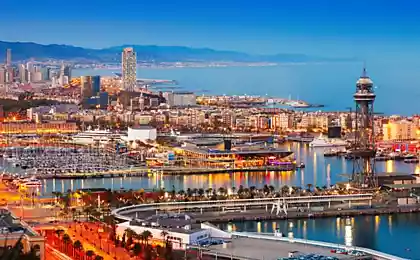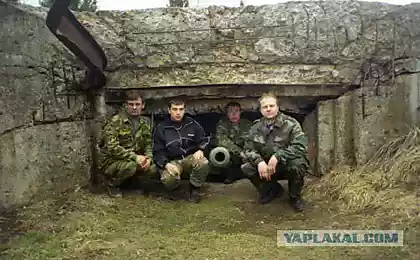1661
Seven Soviet ghost towns
On the territory of the former Soviet Union survived several ghost towns that were abandoned by its inhabitants in different times as a result of a variety of circumstances.
Pripyat
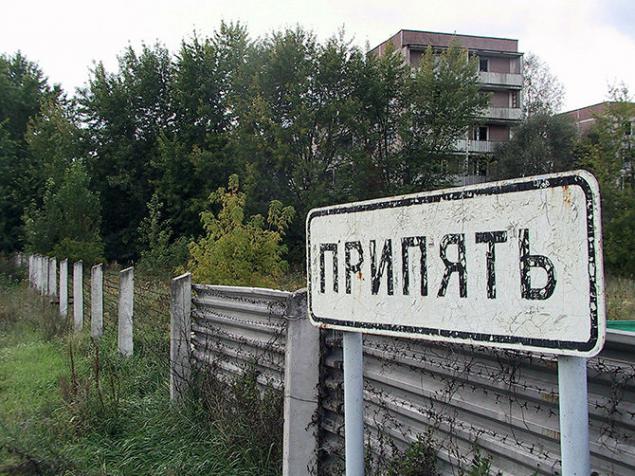
Pripyat - one of the most famous Soviet ghost town. Pripyat was founded in 1970, but the status of the city received only in 1979. Once in Pripyat was built Europe's largest Chernobyl nuclear power plant, the city was named the Atomic City. Unfortunately, Pripyat there was only 16 years old, as in 1986 there was a terrible tragedy, which still speaks the whole world and which are made from living a full life ghost town of Pripyat. This terrible tragedy was an explosion at the Chernobyl nuclear power plant, which is why in the unfavorable radiation environment and residents were urgently evacuated, respectively, substantially all of its inhabitants of Pripyat things left in the city. Now the level of radioactive contamination in significantly reduced, but to live in it is still impossible. However Pripyat has become one of the most popular destinations for tourists stalkers who travel through it, studying a ghost town.
Kadykchan
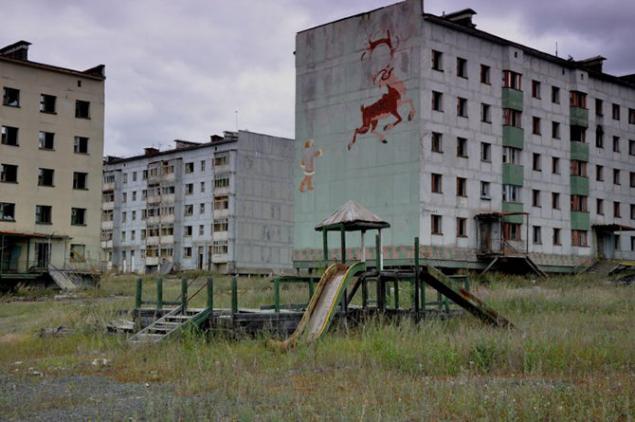
Kadykchan - one of the most famous abandoned settlements of the Magadan region. The village was once stationed one of the Kolyma Gulag. Kadykchan - urban village, which is located in the district of Magadan region Susumansky. It originated during the Great Patriotic War as a settlement for the extraction of coal. The village and the mine were built prisoners. In 1996 there was a tragedy - an explosion at the mine, because that killed six people. Immediately thereafter Kadykchan was closed, people were evicted by paying them compensation for new housing, all the houses have been disconnected from heating and electricity. Until 2010, the village had two residential streets, but in 2010, almost no one left. It is interesting that now resides in Kadykchane one elderly man with two dogs. Still looks like a ghost Kadykchan, as in the homes of people left the books, clothes, toys and garages - their cars.
Old Gubakha
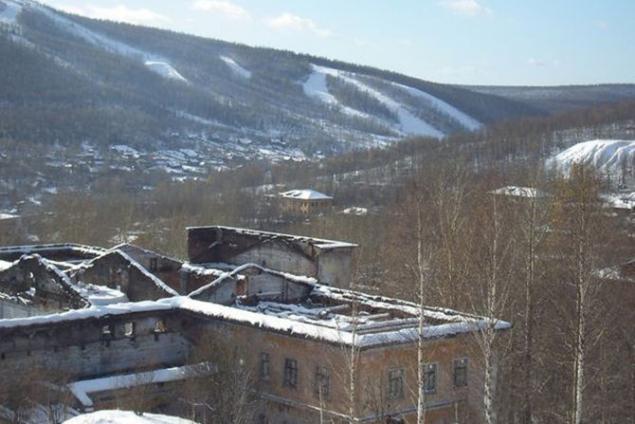
As Kadykchan, Old Gubakha - former village miners. It was located in the Perm region, was subordinate to the city of his lips. In 1721 Solikamsk district Siberian province was opened Kizelovskaya coal deposit, and in 1778 the mines were laid Gubahinskij around which settled workers. In 1941, the old Gubakha was transformed into a city of workers from the villages of lower and upper lips. Unlike other ghost towns, where the accident occurred, Old Gubakha was left residents due to the fact that the coal deposits were exhausted - people in search of work quickly began to leave the city. However, until the end of the city to leave a few residents who have lived here for several years. At the moment, the village is almost completely absorbed by nature.
Iultin
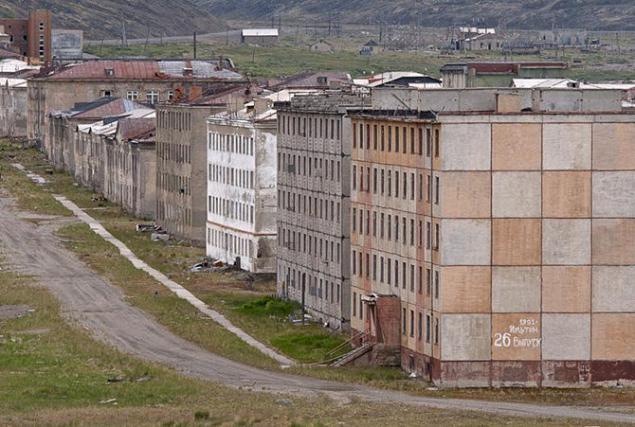
Iultin urban village located in the Chukotka Autonomous Okrug. He was a center of tin mining in Chukotka, one of the largest polymetallic deposits. Iultin located in the spurs Ekvyvatapskogo ridge and connected by road to the port Egvekinot. The area where the village is characterized by heavy weather conditions, which led to difficulties with transportation. Until 1992, the planned production of tin was unprofitable, and in 1994 in a market Iultinsky mine ceased production, and field resources were conserved. In the same year, the village became settle, and in 1995 finally ended its existence when many thousands of the city's population was very hastily to leave, taking with them only the most necessary things. Already in 2000, it is completely dead.
Mologa
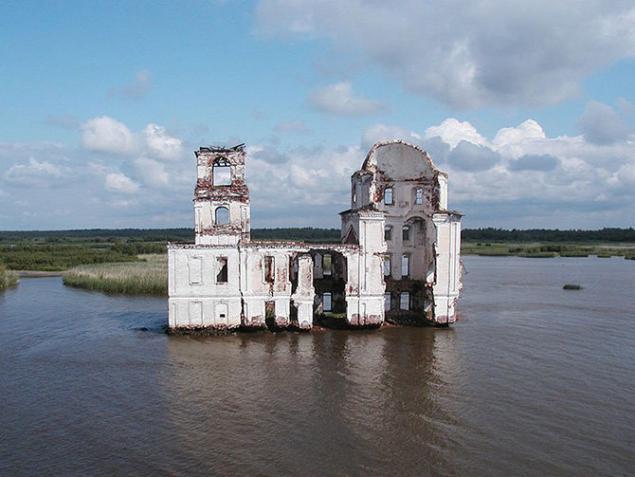
City Mologa is located at the confluence of the Volga River Mologa. The city itself is very old, it was built in the XII century. Later Mologa famous for its beautiful butter and milk, since the spring flood of nutrient rich silt remained in the meadows, after which it was consumed cow. In September 1935, the Government decided to begin construction of the Rybinsk hydroelectric. This meant the flooding of hundreds of thousands of hectares of land with settlements located on it. It's 700 villages and towns Mologa. Liquidation began when the city life flourished in full force. In Mologa was about six cathedrals and churches, factories and about nine schools. In April 1941, the water nearby rivers began to overflow its banks and flood the area, as was closed last opening of the dam. The city began to erode - buildings, churches, factories. Began an urgent evacuation of residents, about 300 people have categorically refused to leave. Many were taken by force. After this began to happen mass suicides among former residents Mologi survivors urgently taken to another part of the country, and the city Mologa was all forgotten and turned into a ghost town with a terrible history.
Chagan
Chagan - urban-type settlement in the East Kazakhstan region, which is 74 kilometers from the city of Semipalatinsk on the bank of the Irtysh River. Once in the town of Chagan population of about 11 thousand inhabitants. He has been landscaped for a full life: there were kindergartens, high school, house officers, stadium, shops and a hotel. From 1958 to 1962, at the site were the most active tests, and in 1995 all military units were withdrawn, the town passed the Republic of Kazakhstan, after which the village was looted. Chagan received the status of a ghost town, which is still a place for research expeditions and invasion stalkers looters.
Neftegorsk
Neftegorsk - urban-type settlement in the Okha region, Sakhalin Island, which was originally conceived as an oil field camp. Neftegorsk was landscaped village, where there was a school and four kindergartens. Basically, in the village lived oil and their families. May 28, 1995, when the school was Neftegorskaya graduates graduation, village caught a terrible tragedy - magnitude earthquake about 7, 6. The devastating effects of the disaster was enormous: in the rubble of buildings killed 2,040 people out of a total population of 3197 people. After this tragedy Neftegorsk village was almost completely destroyed, and the authorities have decided not to rebuild it, and the surviving inhabitants moved to other settlements of Sakhalin Oblast. To this day, the ruins of the ghost town Neftegorsk sometimes being looted looters.
Pripyat

Pripyat - one of the most famous Soviet ghost town. Pripyat was founded in 1970, but the status of the city received only in 1979. Once in Pripyat was built Europe's largest Chernobyl nuclear power plant, the city was named the Atomic City. Unfortunately, Pripyat there was only 16 years old, as in 1986 there was a terrible tragedy, which still speaks the whole world and which are made from living a full life ghost town of Pripyat. This terrible tragedy was an explosion at the Chernobyl nuclear power plant, which is why in the unfavorable radiation environment and residents were urgently evacuated, respectively, substantially all of its inhabitants of Pripyat things left in the city. Now the level of radioactive contamination in significantly reduced, but to live in it is still impossible. However Pripyat has become one of the most popular destinations for tourists stalkers who travel through it, studying a ghost town.
Kadykchan

Kadykchan - one of the most famous abandoned settlements of the Magadan region. The village was once stationed one of the Kolyma Gulag. Kadykchan - urban village, which is located in the district of Magadan region Susumansky. It originated during the Great Patriotic War as a settlement for the extraction of coal. The village and the mine were built prisoners. In 1996 there was a tragedy - an explosion at the mine, because that killed six people. Immediately thereafter Kadykchan was closed, people were evicted by paying them compensation for new housing, all the houses have been disconnected from heating and electricity. Until 2010, the village had two residential streets, but in 2010, almost no one left. It is interesting that now resides in Kadykchane one elderly man with two dogs. Still looks like a ghost Kadykchan, as in the homes of people left the books, clothes, toys and garages - their cars.
Old Gubakha

As Kadykchan, Old Gubakha - former village miners. It was located in the Perm region, was subordinate to the city of his lips. In 1721 Solikamsk district Siberian province was opened Kizelovskaya coal deposit, and in 1778 the mines were laid Gubahinskij around which settled workers. In 1941, the old Gubakha was transformed into a city of workers from the villages of lower and upper lips. Unlike other ghost towns, where the accident occurred, Old Gubakha was left residents due to the fact that the coal deposits were exhausted - people in search of work quickly began to leave the city. However, until the end of the city to leave a few residents who have lived here for several years. At the moment, the village is almost completely absorbed by nature.
Iultin

Iultin urban village located in the Chukotka Autonomous Okrug. He was a center of tin mining in Chukotka, one of the largest polymetallic deposits. Iultin located in the spurs Ekvyvatapskogo ridge and connected by road to the port Egvekinot. The area where the village is characterized by heavy weather conditions, which led to difficulties with transportation. Until 1992, the planned production of tin was unprofitable, and in 1994 in a market Iultinsky mine ceased production, and field resources were conserved. In the same year, the village became settle, and in 1995 finally ended its existence when many thousands of the city's population was very hastily to leave, taking with them only the most necessary things. Already in 2000, it is completely dead.
Mologa

City Mologa is located at the confluence of the Volga River Mologa. The city itself is very old, it was built in the XII century. Later Mologa famous for its beautiful butter and milk, since the spring flood of nutrient rich silt remained in the meadows, after which it was consumed cow. In September 1935, the Government decided to begin construction of the Rybinsk hydroelectric. This meant the flooding of hundreds of thousands of hectares of land with settlements located on it. It's 700 villages and towns Mologa. Liquidation began when the city life flourished in full force. In Mologa was about six cathedrals and churches, factories and about nine schools. In April 1941, the water nearby rivers began to overflow its banks and flood the area, as was closed last opening of the dam. The city began to erode - buildings, churches, factories. Began an urgent evacuation of residents, about 300 people have categorically refused to leave. Many were taken by force. After this began to happen mass suicides among former residents Mologi survivors urgently taken to another part of the country, and the city Mologa was all forgotten and turned into a ghost town with a terrible history.
Chagan
Chagan - urban-type settlement in the East Kazakhstan region, which is 74 kilometers from the city of Semipalatinsk on the bank of the Irtysh River. Once in the town of Chagan population of about 11 thousand inhabitants. He has been landscaped for a full life: there were kindergartens, high school, house officers, stadium, shops and a hotel. From 1958 to 1962, at the site were the most active tests, and in 1995 all military units were withdrawn, the town passed the Republic of Kazakhstan, after which the village was looted. Chagan received the status of a ghost town, which is still a place for research expeditions and invasion stalkers looters.
Neftegorsk
Neftegorsk - urban-type settlement in the Okha region, Sakhalin Island, which was originally conceived as an oil field camp. Neftegorsk was landscaped village, where there was a school and four kindergartens. Basically, in the village lived oil and their families. May 28, 1995, when the school was Neftegorskaya graduates graduation, village caught a terrible tragedy - magnitude earthquake about 7, 6. The devastating effects of the disaster was enormous: in the rubble of buildings killed 2,040 people out of a total population of 3197 people. After this tragedy Neftegorsk village was almost completely destroyed, and the authorities have decided not to rebuild it, and the surviving inhabitants moved to other settlements of Sakhalin Oblast. To this day, the ruins of the ghost town Neftegorsk sometimes being looted looters.



